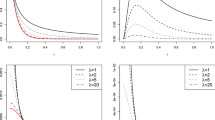Abstract
Limit distributions of maxima of dependent Gaussian sequence are different according to the convergence rate of their correlations. For three different conditions on convergence rate of the correlations, in this paper, we establish the Piterbarg theorem for maxima of stationary Gaussian sequences.
Similar content being viewed by others
References
S.M. Berman, Limit theorems for the maximum term in stationary sequences, Ann. Math. Stat., 35:502–516, 1964.
L. Cao and Z. Peng, Asymptotic distributions of maxima of complete and incomplete samples from strongly dependent stationary Gaussian sequences, Appl. Math. Lett., 24(2):243–247, 2011.
M. Falk, J. Hüsler, and R.-D. Reiss, Laws of Small Numbers: Extremes and Rare Events, DMV Seminar, Vol. 23, 3rd ed., Birkhäuser, Basel, 2010.
J. Hüsler and V.I. Piterbarg, Limit theorem for maximum of the storage process with fractional Brownian motion as input, Stoch. Process. Appl., 114(2):231–250, 2004.
T. Krajka, The asymptotic behaviour of maxima of complete and incomplete samples from stationary sequences, Stoch. Process. Appl., 121(8):1705–1719, 2011.
A.V. Kudrov and V.I. Piterbarg, On maxima of partial samples in Gaussian sequences with pseudo-stationary trends, Lith. Math. J., 47(1):48–56, 2007.
M.R. Leadbetter, G. Lindgren, and H. Rootzén, Extremes and Related Properties of Random Sequences and Processes, Springer Ser. Stat., Vol. 11, Springer-Verlag, New York, Heidelberg, Berlin, 1983.
Y. Mittal, Comparison technique for highly dependent stationary Gaussian processes, in J. Tiago de Oliveira (Ed.), Statistical Extremes and Applications, Reidel, Dordrecht, 1984, pp. 181–195.
Y. Mittal and D. Ylvisaker, Limit distributions for the maxima of stationary Gaussian processes, Stoch. Process. Appl., 3(1):1–18, 1975.
P. Mladenović and V.I. Piterbarg, On asymptotic distribution of maxima of complete and incomplete samples from stationary sequences, Stoch. Process. Appl., 116(12):1977–1991, 2006.
Z. Peng, L. Cao, and S. Nadarajah, Asymptotic distributions of maxima of complete and incomplete samples from multivariate stationary Gaussian sequences, J. Multivariate Anal., 101(10):2641–2647, 2010.
V.I. Piterbarg, Asymptotic Methods in the Theory of Gaussian Processes and Fields, Transl. Math. Monogr., Vol. 148, Amer. Math. Soc., Providence, RI, 1996.
V.I. Piterbarg, Discrete and continuous time extremes of Gaussian processes, Extremes, 7(2):161–177, 2004.
Z. Tan and E. Hashorva, Exact tail asymptotics of the supremum of strongly dependent Gaussian processes over a random interval, Lith. Math. J., 53(1):91–102, 2013.
Z. Tan and E. Hashorva, On Piterbarg max-discretisation theorem for standardised maximum of stationary Gaussian processes, Methodol. Comput. Appl. Probab., 2013 (in press), doi:10.1007/s11009-012-9305-8.
Z. Tan and Y. Wang, Some asymptotic results on extremes of incomplete samples, Extremes, 15(3):319–332, 2012.
Author information
Authors and Affiliations
Corresponding author
Additional information
1The author is supported partially by the Swiss National Science Foundation project 200021-1401633/1.
2The author has been supported by the National Natural Science Foundation of China under grant 11171275 and by the Natural Science Foundation Project of CQ under cstc2012jjA00029.
3The author has been partially supported by the Swiss National Science Foundation project 200021–134785 and by the project RARE-318984 (a Marie Curie International Research Staff Exchange Scheme Fellowship within the 7th European Community Framework Programme).
Rights and permissions
About this article
Cite this article
Hashorva¹, E., Peng², Z. & Weng³, Z. On Piterbarg theorem for maxima of stationary Gaussian sequences. Lith Math J 53, 280–292 (2013). https://doi.org/10.1007/s10986-013-9208-6
Received:
Revised:
Published:
Issue Date:
DOI: https://doi.org/10.1007/s10986-013-9208-6



